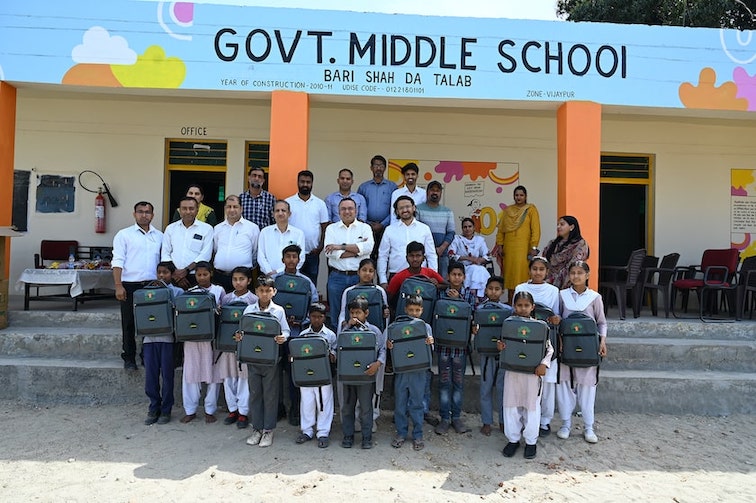Education has always been known to be a factor of development in a country’s social and economic growth. India has always had a high potential for skilled human capital and immense opportunities to establish its distinctive position in the world. However, the country’s education sector does face its obstacles with the alarmingly high dropout rates, which emphasises the need to support students to ensure the nation’s global competitiveness.
To address the gaps in the education framework, the Indian government has formulated holistic provisions through initiatives in the form of necessary financial and infrastructure support. In addition, the private sector is also contributing to mitigating the issues of affordability and accessibility through non-profit initiatives. Collaborations between both the government and the private sector is gradually progressing to provide the country’s youth with better access to adequate knowledge and quality education in urban and rural areas. However, despite decades of efforts and reforms by the Indian government, a considerable number of students continue to drop out of the education system. Further, lack of educational abilities in the rural sector is known to lead to unemployment, and ultimately leading to poverty and other social barriers.
Addressing the limits to learning with CSR
Quality education, digital and technological skills, scholarships, sponsorships, career counseling, better infrastructure, and teacher training are essential to boost the entire education ecosystem. Leading companies are applying revolutionary education-related CSR policies to their broad-scale business strategies, analysing its efficiency in education to bring innovation to the system and gear up the economy. In recent years, CSR practices have evolved significantly, supported by enhanced compliances that mandate all firms with a net worth above Rs 500 crores, net profit over Rs 5 crore… mid-size and large firms in India to spend 2% of their annual earnings on donations as a part of CSR.
Such reforms have opened doors for companies to create a positive impact and contribute to the well-being of society. While India Inc. is effectively integrating CSR into their sustainable business strategy, when analysing various branches of Indian landscapes, the root that needs to strengthen the most through CSR is the education ecosystem of India.
Strengthening the education ecosystem with CSR
Improving academic standards in economically backward schools is inevitable to help students secure pinnacles of accomplishments in any profession. While some organisations donate funds, others give back to society by volunteering and donating their time, products, and services, which in turn gives employees a purpose and creates a healthy work environment. Here are three best practices that organisations can implement to ensure inclusive and equitable quality education and promote lifelong learning opportunities for all:
– Facilitating education, knowledge, and skill transfer:
Companies can impart knowledge and provide students with an environment for learning that includes hygienic sanitation. Venturing into providing academic support such as customised learning modules for government school students, free access to coaching for competitive exams, teaching underprivileged students life skills and soft skills, adopting government schools and creating programs to train differently-abled students, can make a difference in the lives of deserving and needy youth.
– Partnering with non-profit organisations:
Engaging with non-profit organisations can help actively pursue shared values towards the same goals. Companies can partner with public charitable trusts that work towards providing educational infrastructural support to the government schools of rural India. Taking responsibility for the higher education, skill development, and mentoring of abandoned or orphaned children, women, and youth and rewarding them with scholarships can build competent and conscientious human beings, fully capable of organising and finally leading a profession.
– Volunteering to bring awareness on technology:
Promoting volunteering develops organizational commitment among employees. Companies can provide hands-on experience in the fundamentals of security and compliance with certification programs and cyber safety sessions to help teachers and students safeguard themselves from online bullying and fraud in the digital era of education.
– Building infrastructure and the future of the learning ecosystem:
Various issues such as the lack of access to safe drinking water, poor condition of building premises and facilities, and inaccessibility of advanced education to the teachers etc. hamper the quality of learning experiences. By enabling and equipping the educators with training programs, adopting schools to improve its conditions, or building new ones, companies can create meaningful learning and development and build an ecosystem where everyone has accessibility to the necessary resources. For instance, to power better educational journeys, Amadeus adopted 98 schools and installed rainwater harvesting units in government primary schools. These efforts to address some of the grass root level issues have also been recognised and appreciated by the government.
While facilitating the provision of infrastructure and a range of skills for educators can pave a smooth path to quality education, organisations need to pick projects and offer long term support to truly transform the future of the ecosystem. Creating a positive impact through CSR has emerged as a global trend, acknowledged in every sector and type of organisation to mitigate risks, enhance reputation, and contribute to business results. Today, businesses are focusing on a more targeted approach in their CSR programs and seek to impact areas that correlate with the company’s purpose and values. With the capability to make a real and lasting difference, developing coherent CSR strategies in education is the path to unlock the country’s true potential, help students climb out of intergenerational poverty, and prepare the next generation of leaders with a passport to the future.
Views of the author are personal and do not necessarily represent the website’s views.
Shalini Nair Kumar is the Head of People & Culture, Communications & Branding and Facilities for India and Asia-Pacific at Amadeus, which is a leading travel technology provider with about 1.6,000 employees working across 50 offices worldwide. Amadeus Labs Bengaluru is the second largest Engineering and R&D Centre for Amadeus in the world, where over 3,000 people work on niche travel technology solutions.


